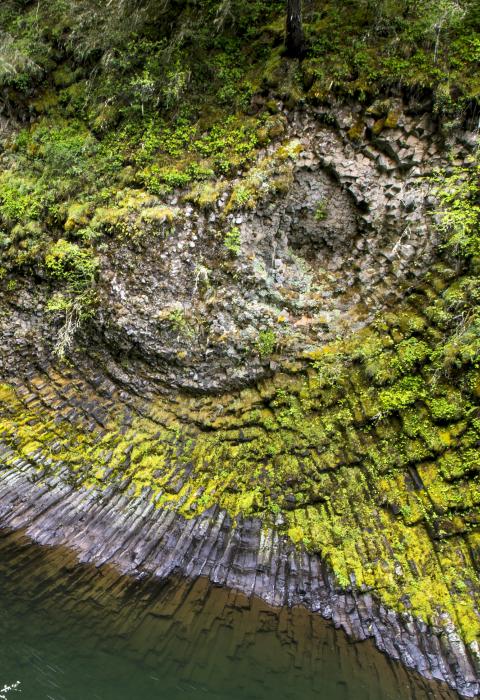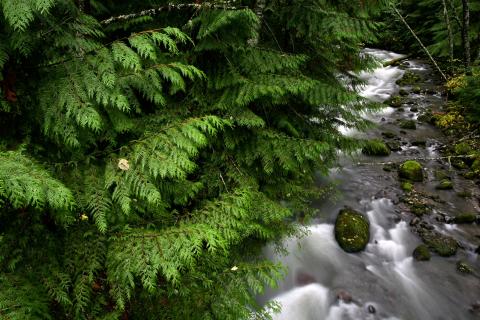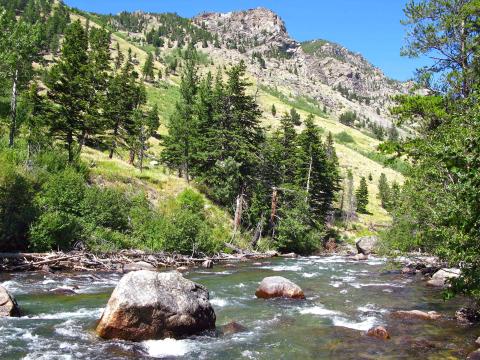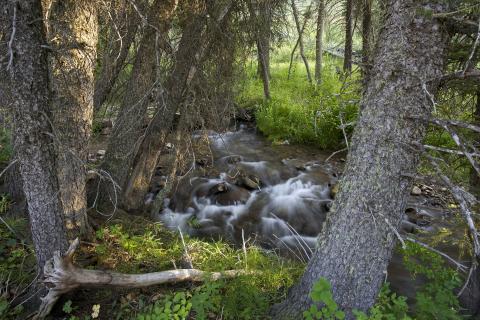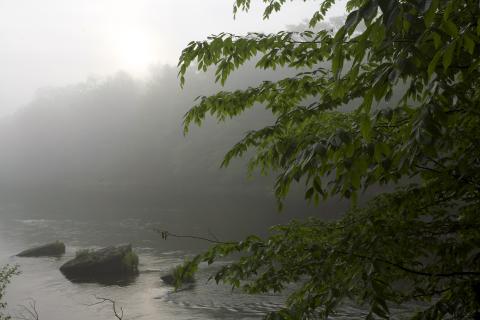Do not burn yourselves out. Be as I am—a reluctant enthusiast . . . a part-time crusader, a half-hearted fanatic. Save the other half of yourselves and your lives for pleasure and adventure. It is not enough to fight for the land; it is even more important to enjoy it. While you can. While it's still here. So get out there and hunt and fish and mess around with your friends, ramble out yonder and explore the forests, climb the mountains, bag the peaks, run the rivers, breathe deep of that yet sweet and lucid air, sit quietly for a while and contemplate the precious stillness, the lovely, mysterious, and awesome space. Enjoy yourselves, keep your brain in your head and your head firmly attached to the body, the body active and alive, and I promise you this much: I promise you this one sweet victory over those desk-bound men with their hearts in a safe deposit box and their eyes hypnotized by desk calculators. I promise you this: you will outlive the bastards. — (Edward Abbey)
Growth for the sake of growth is the ideology of the cancer cell. — (Edward Abbey, "Money, Et Cetera'' in A Voice Crying in the Wilderness)
Let us have a splendid legacy for our children . . . let us turn to them and say 'this you inherit and guard it well, for it is far more precious than money . . . and once it is destroyed, nature's beauty cannot be repurchased at any price.' — (Ansel Adams, Speech in Monterey County (Date Unknown))
In the 19th century, we devoted our best minds to exploring nature. In the 20th century, we devoted ourselves to controlling and harnessing it. In the 21st century, we must devote ourselves to restoring it. — (Stephen Ambrose, Historian)
The frog does not drink up the pond in which he lives. — (American Indian Proverb, Quoted in David Zwick, Water Wasteland)
You cannot affirm the power plant and condemn the smokestack, or affirm the smoke and condemn the cough. — (Wendell Berry, The Gift of the Good Land)
Those who contemplate the beauty of the earth find reserves of strength that will endure as long as life lasts. — (Rachel Carson)
Conservation is a cause that has no end. There is no point at which we will say our work is finished. — (Rachel Carson, On accepting the Audubon Medal (National Audubon Society) in 1964.)
It is a curious situation that the sea, from which life first arose should now be threatened by the activities of one form of that life. But the sea, though changed in a sinister way, will continue to exist; the threat is rather to life itself. — (Rachel Carson, The Sea Around Us)
Only within the moment of time represented by the present century has one species—man—acquired significant power to alter the nature of the world. — (Rachel Carson, Silent Spring)
We are not truly civilized if we concern ourselves only with the relation of man to man. What is important is the relation of man to all life. — (Rachel Carson, Silent Spring paraphrasing Dr. Albert Schweitzer)
If I live to be old enough, I may sit down under some bush, the last left in the utilitarian world, and feel thankful that intellect in its march has spared one vestige of the ancient forest for me to die by. — (Painter Thomas Cole to his patron, Luman Reed (Smithsonian 1994))
The air, the water and the ground are free gifts to man and no one has the power to portion them out in parcels. Man must drink and breathe and walk and therefore each man has a right to his share of each. — (James Fennimore Cooper, The Prairie)
The oceans are the planet's last great living wilderness, man's only remaining frontier on earth, and perhaps his last chance to produce himself a rational species. — (John Cullney, Wilderness Conservation Magazine, September-October 1990)
We will look upon the earth and her sister planets as being with us, not for us. — (Mary Daly, "Beyond God the Father")
The weight of our civilization has become so great, it now ranks as a global force and a significant wild card in the human future, along with the Ice Ages and other vicissitudes of a volatile and changeable planetary system. — (Dianne Dumanoski, "Rethinking Environmentalism," December 13, 1998)
Until man duplicates a blade of grass, nature can laugh at his so-called scientific knowledge. — (Thomas Edison)
The use of sea and air is common to all; neither can a title to the ocean belong to any people or private persons, forasmuch as neither nature nor public use and custom permit any possession thereof. — (Elizabeth I of England)
To the attentive eye, each moment of the year has its own beauty . . . it beholds, every hour, a picture which was never seen before, and which shall never be seen again. — (Ralph Waldo Emerson)
He who knows what sweets and virtues are in the ground, the waters, the plants, the heavens, and how to come at these enchantments, is the rich and royal man. — (Ralph Waldo Emerson, Essays, Second Series)
Hast thou named all the birds without a gun;
Loved the wood-rose, and left it on its stalk? — (Ralph Waldo Emerson, Forbearance)
Let us permit nature to have her way: She understands her business better than we do. — (Michel Eyquem de Montaigne)
Nature provides exceptions to every rule. — (Margaret Fuller, "The Dial," July 1843)
Earth provides enough to satisfy every man's need, but not every man's greed. — (Mohandas K. Gandhi as quoted in EF Schumacher's Small is Beautiful)
How changed has the great Western continent become! West! Farther west, still farther west I pushed my way but the game had gone to the spirit land . . . grizzly bears, where they had once been numerous, had entirely disappeared and the weird voice of the wolf was unknown. — (Parker Gilmore)
It's easy to become hopeless. So people must have hope—the human brain, the resilience of nature, the energy of young people and the sort of inspiration that you see from so many hundreds of people who tackle tasks that are impossible and never give up and succeed. — (Dr. Jane Goodall)
All is connected . . . no one thing can change by itself. — (Paul Hawken, The Ecology of Commerce)
"What do you have when the last bear is gone? And the last wolf?"
"I don't know," the young man said. "What?"
"Why you have safety; it is safe then to have more farms too poor to support people and more people who cannot live on the farms, and finally you have the tourists who are disappointed because they really came to see the bears." — (Dion Henderson, The Ninety-ninth Bear)
The famous balance of nature is the most extraordinary of all cybernetic systems. Left to itself, it is always self-regulated. — (Joseph Wood Krutch, "Saturday Review," June 8, 1963)
One of the penalties of an ecological education is that one lives alone in a world of wounds. — (Aldo Leopold, A Sand County Almanac)
In our attempt to make conservation easy, we have made it trivial. — (Aldo Leopold, A Sand County Almanac)
We realize the indivisibility of the earth—its soil, mountains, rivers, forests, climate, plants, and animals—and respect it collectively not only as a useful servant but as a living being, vastly greater than ourselves in time and space—a being that was old when the morning stars sang together, and when the last of us has been gathered unto his fathers, will still be young. — (Aldo Leopold, Some Fundamentals of Conservation in the Southwest, 1923)
Thus far we have considered the problem of conservation of land purely as an economic issue. A false front of exclusively economic determinism is so habitual to Americans in discussing public questions that one must speak in the language of compound interest to get a hearing. — (Aldo Leopold, Some Fundamentals of Conservation in the Southwest, 1923)
We abuse land because we view it as a commodity belonging to us. When we see land as a community to which we belong, we may begin to use it with love and respect. — (Aldo Leopold, A Sand County Almanac)
We console ourselves with the comfortable fallacy that a single museum piece will do, ignoring the clear dictum of history that a species must be saved in many places if it is to be saved at all. — (Aldo Leopold, A Sand County Almanac)
If the land mechanism as a whole is good, then every part is good, whether we understand it or not. If the biota in the course of aeons, has built something we like but do not understand, then who but a fool would discard seemingly useless parts? To keep every cog and wheel is the first precaution of intelligent tinkering. — (Aldo Leopold, The Round River – A Parable
So Nature deals with us, and takes away
Our playthings one by one, and by the hand
Leads us to rest.
(Henry W. Longfellow, Nature)
Have we come all this way, I wondered, only to be dismantled by our own technologies, to be betrayed by political connivance or the impersonal avarice of a corporation? — (Barry Lopez, Arctic Dreams)
If we use resources productively and take to heart the lessons learned from coping with the energy crisis, we face a future confronted only, as Pogo, once said, by insurmountable opportunities. The many crises facing us should be seen, then, not as threats, but as chances to remake the future so it serves all beings.) — (L. Hunter Lovins and Amory B. Lovins, Utne Reader Magazine (November-December 1989))
Earth and Sky, Woods and Fields, Lakes and Rivers, the Mountain and the Sea, are excellent schoolmasters, and teach some of us more than we can ever learn from books. — (John Lubbock, The Use of Life
Rest is not idleness, and to lie sometimes on the grass under the trees on a summer's day, listening to the murmur of water, or watching the clouds float across the blue sky, is by no means waste of time. — (John Lubbock, The Use of Life
He wondered what kind of blueprint beavers had for creating such a structure—or did they simply start aimlessly weaving stuff together until they had a dam? Did they even think about creating a dam? Maybe dams were simply accidents that resulted from their fooling around, much like the Army Corps of Engineers' accomplishments. — (Patrick McManus, The Huckleberry Murders)
When we try to pick out anything by itself, we find it hitched to everything else in the universe. — (John Muir, My First Summer in the Sierra)
Thousands of tired, nerve-shaken, over-civilized people are beginning to find out that going to the mountains is going home; that wilderness is a necessity; and that mountain parks and reservations are useful not only as fountains of timber and irrigating rivers, but as fountains of life! — (John Muir, Our National Parks)
Wilderness itself is the basis of all our civilization. I wonder if we have enough reverence for life to concede to wilderness the right to live on? — (Mardy Murie)
We will be known forever by the tracks we leave. — (Native American Proverb)
The ultimate test of man's conscience may be his willingness to sacrifice something today for future generations whose words of thanks will not be heard. — (Senator Gaylord Nelson of Wisconsin)
While progress should never come to a halt, there are many places it should never come to at all. — (Paul Newman for The Nature Conservancy)
The least movement is of importance to all nature. The entire ocean is affected by a pebble. — (Blaise Pascal, Pensées, 1670)
The earth does not belong to any man; Man belongs to the earth. This we know.
All things are connected like the blood, which unites one family. All things are connected.
Whatever befalls the earth befalls the sons of the earth. Man did not weave the web of life. He is merely a strand in it. What he does to the web, he does to himself. This we know. — (Ted Perry, 1971, in the script for Home embellishing on a speech given by Chief Sealth, 1854)
Conservation means the wise use of the earth and its resources . . . for the greatest good of the greatest number for the longest time. — (Gifford Pinchot, Breaking New Ground)
Leave it as it is . . . The ages have been at work on it, and man can only mar it. — (Theodore Roosevelt)
It is in man's heart that the life of nature's spectacle exists; to see it, one must feel it. — (Jean-Jacques Rousseau, Emile)
Nature is painting for us, day after day, pictures of infinite beauty. — (John Ruskin)
Anything else you're interested in is not going to happen if you can't breathe the air and drink the water. Don't sit this one out. Do something. You are by accident of fate alive at an absolutely critical moment in the history of our planet. — (Dr. Carl Sagan)
Believe one who knows: You will find something greater in woods than in books. Trees and stones will teach you that which you can never learn from masters. — (St. Bernard of Clairvaux, Epistles)
In the end, our society will be defined not only by what we create but by what we refuse to destroy. — (John Sawhill, The Nature Conservancy)
One touch of nature makes the whole world kin. — (William Shakespeare, Troilus and Cressida)
Away, away, from men and towns,
To the wild wood and the downs, —
To the silent wilderness,
Where the soul need not repress
Its music. — (Percy Bysshe Shelley, "To Jane, The Invitation")
If a tree falls in the forest, will you make a sound? — (Homer Simpson, The Simpsons)
Something will have gone out of us as a people if we ever let the remaining wilderness be destroyed, if we permit the last virgin forests to be turned into comic books and plastic cigarette cases; if we drive the few remaining members of the wild species into zoos or to extinction; if we pollute the last clear air and dirty the last clean streams and push our paved roads through the last of the silence, so that never again will Americans be free in their own country from the noise, the exhausts, the stinks of human and automotive waste. And so that never again can we have the chance to see ourselves single, separate, vertical and individual in the world, part of the environment of trees and rocks and soil, brother to the other animals, part of the natural world and competent to belong in it. — (Wallace Steger, Earth Prayers from Around the World)
Let us spend one day as deliberately as Nature, and not be thrown off the track by every nutshell and mosquito's wing that falls on the rails. — (Henry David Thoreau)
We have forgotten how to be good guests, how to walk lightly on the earth as its other creatures do. — (Barbara Ward, Only One Earth)
To be whole. To be complete. Wildness reminds us what it means to be human, what we are connected to rather than what we are separate from. — (Terry Tempest Williams, Testimony Before the Senate Subcommittee on Forest & Public Lands Management Regarding the Utah Public Lands Management Act of 1995, July 13, 1995)

